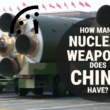My colleague Sadia Tasleem, discussing whether Pakistan might be considered a potential target of US deterrence policy, noted in her second essay that her nation has not "help[ed] terrorists gain access to weapons of mass destruction." This is true—so far. And while it is reassuring that over recent years Pakistan has enacted measures to enhance its nuclear security, one may still be forgiven a twinge of concern: Between 2007 and 2012 terrorists carried out six attacks against Pakistan's sensitive military installations, some of which are believed to house nuclear components, and the terrorists demonstrated an ability to penetrate progressively deeper. These days, Pakistan-bred terrorist organizations are as opposed to the United States and India as they are to their own establishment, and, as I argued in Round One, insider collusion with them cannot be dismissed. As Pakistan frantically expands its nuclear arsenal, and diversifies it to include tactical capabilities, the sources from which terrorists might gain access to weapons also multiply. For all these reasons, I continue to believe that Pakistan is just the sort of country that might find itself running afoul of US policy on terrorism and nuclear deterrence.
Establishing state complicity, however, is a complicated affair, and Tasleem makes a valid point when she questions how the United States would guard against miscalculation and misjudgment. But nuclear forensics holds out the promise of establishing culpability: Analysis of radiological fallout can provide valuable clues about the type and source of fissile material used in a detonation. Also, space-based intelligence, surveillance, and reconnaissance are making nations' nuclear activities more transparent. In the long run, no nation will be able to escape the consequences if it is complicit in an act of nuclear terrorism.
Fortunately, no act of nuclear terrorism has ever occurred. But this won't last unless a longer-term and more holistic approach to the very existence of nuclear weapons is developed. My fellow participants in this Roundtable do not offer much hope that this can be achieved. Tasleem seems to harbor little optimism for arms control in South Asia; Evgeny Buzhinsky gloomily assesses nuclear disarmament as unrealistic.
A valuable step, if the idea that nuclear weapons should be eliminated does not find universal acceptance, would be to decrease the value accorded to nuclear weapons. The United States made a welcome move in this direction with the release of its 2010 Nuclear Posture Review (even though US nuclear policy can still be faulted in a number of ways). And I applaud the two "transitions" that Buzhinsky proposed in his first essay—toward collective approaches to emerging threats instead of national approaches; and toward negative control of nuclear weapons instead of positive control.
I would add another transition to this list. An indirect method of combating nuclear terrorism might lie in establishing a legal norm against using nuclear weapons. I know terrorists don't play by rules, but a universal, legally binding convention banning the use and threat of use of nuclear weapons would carry two important implications for nuclear terrorism. First, it would devalue nuclear weapons as state instruments, and this would reduce the secrecy and opacity that surround nuclear weapons; promote transparent accounting of material and warheads; and ultimately reduce the risk of theft. Second, by enhancing transparency and trust, a convention would facilitate international cooperation in intelligence sharing and law enforcement and thus enhance global security. Nations united against breaches of the norm would collectively be better equipped—politically and morally—to respond to violations, whether they were carried out by state or non-state actors.
Buzhinsky notes that "nuclear weapons cannot solve the vital problems of the 21st century." Indeed they cannot, and I would argue that nuclear weapons simply create new problems. Nuclear weapons serve only narrow, entrenched national interests; visionary leaders must look beyond these interests and focus instead on global security.
Topics: Nuclear Weapons
Share: [addthis tool="addthis_inline_share_toolbox"]














